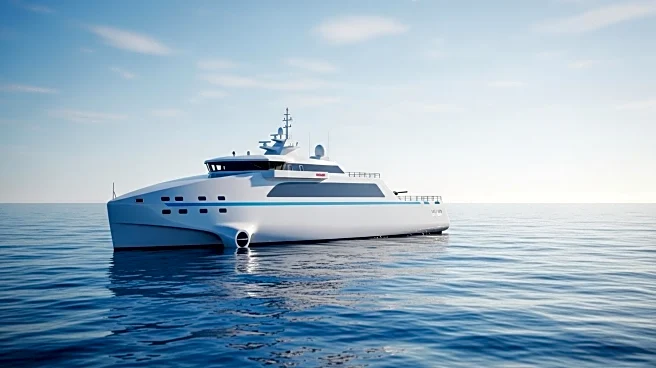What is the story about?
What's Happening?
Blue Water Autonomy has successfully raised $50 million in Series A funding to advance its development of autonomous ships, as announced on August 26. The funding round was led by Google Ventures (GV), which also participated in the company's earlier $14 million seed funding round. This financial boost will enable Blue Water Autonomy to build and deploy its first long-range, full-sized autonomous ship by 2026. The company has significantly expanded its team and completed successful engineering tests on water, while also beginning to acquire materials from over 50 suppliers. The CEO, Rylan Hamilton, emphasized the urgent need for autonomous ships tailored for maritime security and logistics, highlighting their potential to operate on the open ocean for extended periods.
Why It's Important?
The development of autonomous ships by Blue Water Autonomy represents a significant advancement in maritime technology, with implications for both security and logistics. These ships are designed to complement traditional naval assets, offering affordable and versatile platforms capable of carrying varied payloads. The funding and subsequent development could enhance maritime security operations, providing the U.S. Navy with innovative tools to address emerging threats. Additionally, the commercial market may benefit from these autonomous vessels, potentially revolutionizing shipping and logistics by reducing human resource needs and increasing operational efficiency.
What's Next?
Blue Water Autonomy plans to deploy its first prototype autonomous ship by 2026, marking a critical milestone in its development process. The company will continue to expand its team and acquire necessary materials to support this goal. As the project progresses, stakeholders in the maritime industry, including defense and commercial sectors, will likely monitor its impact on security and logistics operations. The integration of autonomous ships into naval fleets could prompt further investment and interest in unmanned maritime technologies.
Beyond the Headlines
The shift towards autonomous maritime technology raises ethical and legal considerations, particularly regarding the deployment of unmanned vessels in international waters. Questions about accountability, safety, and regulatory compliance will need to be addressed as these technologies become more prevalent. Additionally, the long-term impact on employment in the maritime industry could be significant, as automation may reduce the need for human crews.
















